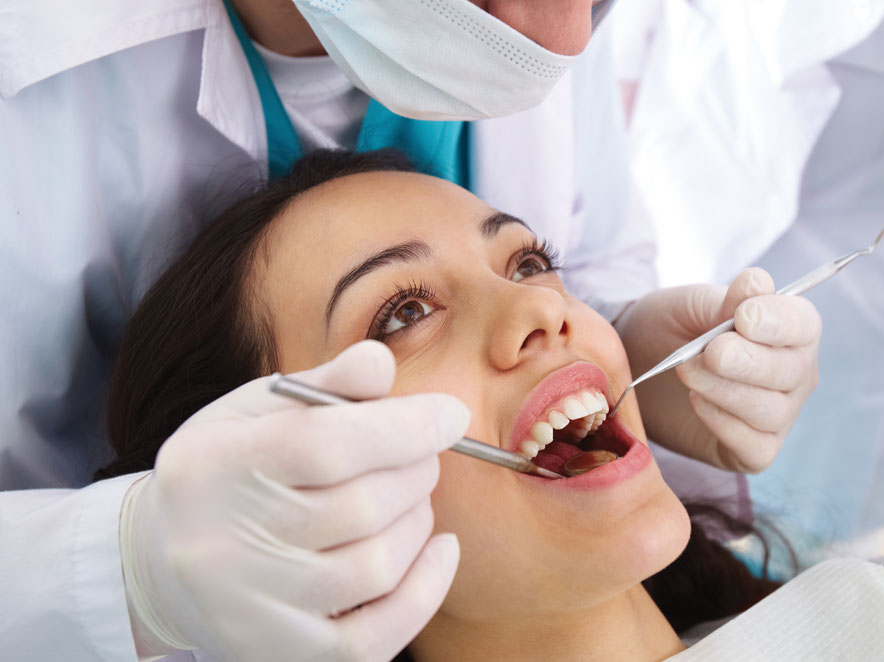
Gum Disease
EXPERIENCING SYMPTOMS OF GUM DISEASE?
Get treatment for gums
Gum disease (known as periodontal disease) is the inflammation and infection of the gum and the supporting structures of the teeth. It is a significant cause of tooth loss in our population and is caused by bacteria in the form of plaque. At MC Dental, our professional team are experienced in diagnosing and treating gum issues to provide you with relief and improved oral health.
Smoking is a significant risk factor for gum disease, but it can also be complicated by other conditions such as diabetes, stress, oral hygiene and various medications. There’s no need to feel embarrassed about getting treatment. At MC Dental, we treat gum issues every day and welcome you to book an appointment so that you can enjoy healthier gums.

There are two common types of gum disease, including:
Gingivitis
Gingivitis is a reversible gum inflammatory condition caused by plaque and calculus bacteria. It can be treated successfully by removing plaque and calculus and brushing and flossing daily.
Periodontitis
This is an advanced stage of gingivitis. Gum pockets are formed, and gums may recede from the teeth. Consequently, the teeth can become loose, fall out or require extraction by a dentist. Many teeth can be lost through periodontitis, so early detection is essential.

Treatment of gum disease
Treatment can stop or slow down the progression of the disease and typically involves:
- Professional cleaning of the teeth above and below the gum line (into the pockets) to remove the plaque and hard deposits (calculus/tartar)
- Regular dental check-ups to monitor the treatment of the disease
- Eliminating risk factors such as smoking
- Excellent oral hygiene maintained daily with correct brushing and flossing
- As gum diseases can reoccur, maintenance therapy that follows treatment is the most crucial step in preventing the return of gum irritation. Your dentist will work with you to stop, monitor and control the gum disease.
Gum disease treatment FAQ
Here are some common signs that may suggest serious gum disease:
Gum Inflammation: Swollen, red, or sensitive gums can be an early indication of gum disease. Please take note if your gums easily bleed during brushing or flossing.
Receding Gums: If you observe that your teeth appear longer or notice gaps between your teeth and gums, it could be a sign of gum recession caused by gum disease.
Persistent Bad Breath: Gum disease often leads to persistent bad breath that continuing even after brushing teeth. This unpleasant odor is caused by the accumulation of bacteria in the mouth.
Loose Teeth: As gum disease progresses, it can weaken the supporting tissues and bone structure around your teeth, resulting in tooth looseness or tooth shifting.
Pus or Discharge: The presence of pus or discharge between your gums and teeth can indicate the infection caused by gum disease.
If you experience any of above signs, it’s advisable to immediately consult your dentist. Early detection and treatment can help prevent further damage.
Gingivitis, the early stage of gum disease, is a common oral health issue in Australia. According to dental studies and surveys, a significant portion of the Australian population experiences gingivitis to some degree.
Factors such as poor oral hygiene, inadequate dental care, tobacco use, certain medical conditions, and delay of treatment can contribute to the development of gingivitis. Therefore, maintaining proper oral hygiene, including regular brushing, flossing, and professional dental cleanings, is essential in preventing and managing gingivitis.
If you suspect you have gingivitis or are concerned about your gum health, it is advisable to consult with a dental professional. They can evaluate your condition, provide appropriate treatment, and offer guidance on maintaining optimal oral health.
The four stages of periodontal disease are:
Stage 1: Gingivitis – the initial stage of periodontal disease and you can see the inflammation of the gums. Symptoms may include gum redness, swelling, and bleeding during brushing or flossing. At this stage, the bone and connective tissues that support the teeth are not yet affected, and the damage is reversible with proper treatment and improved oral hygiene.
Stage 2: Early Periodontitis – As periodontal disease progresses, it enters the early stage of periodontitis. In this stage, the infection begins to affect the supporting structures of the teeth. The gums may recede, forming pockets between the teeth and gums. Professional treatment and improved oral care are essential to prevent further damage and stop the progression of the disease.
Stage 3: Moderate Periodontitis – At this stage, periodontal disease becomes more advanced. The pockets between the teeth and gums deepen, allowing bacteria to accumulate and cause further damage. The supporting bone and tissues continue to be affected, leading to tooth mobility, shifting, and potential tooth loss. Prompt intervention by a dental professional is crucial to prevent further deterioration.
Stage 4: Advanced Periodontitis – This is the most severe stage of periodontal disease. The infection has caused significant damage to the supporting structures of the teeth, including bone loss and gum recession. Tooth loss can be common at this stage, and extensive treatment, such as gum surgery and tooth replacement options, may be necessary to restore oral health.
It’s important to note that early detection and treatment are key to preventing the progression of periodontal disease. Regular dental check-ups, proper oral hygiene practices, and seeking professional care are absolutely vital in maintaining healthy gums and preventing the advancement of periodontal disease.
While gum disease can lead to tooth loss, it doesn’t mean you will lose all your teeth. The severity and progression of gum disease vary among individuals. Early intervention, professional treatment, and good oral care can prevent further gum damage. Regular dental check-ups and following dental guidance can reduce the risk of tooth loss associated with gum disease.



